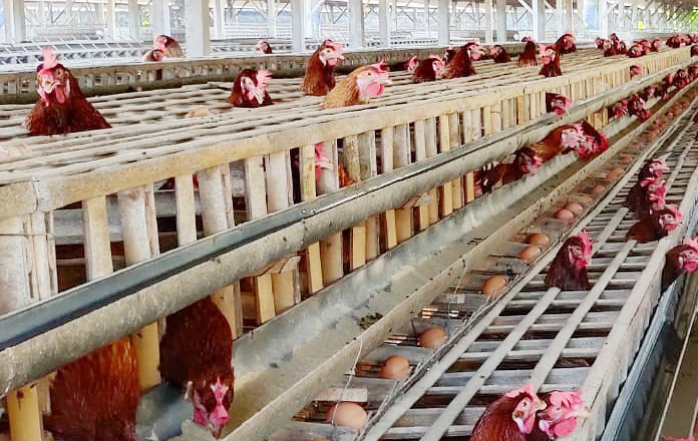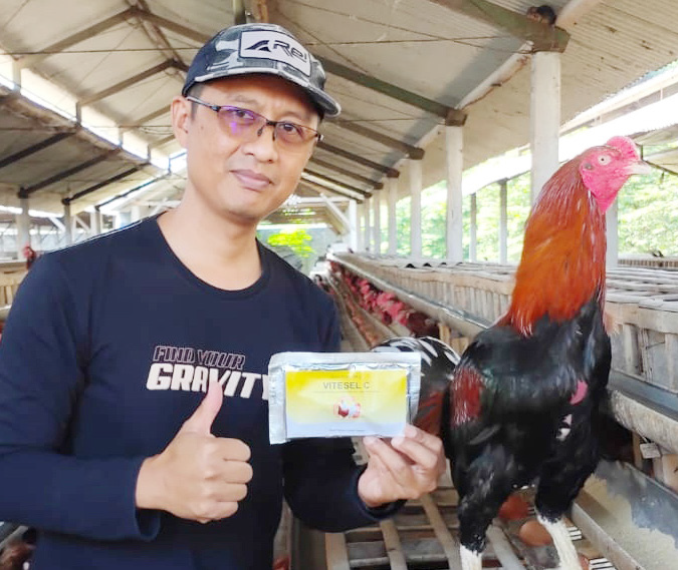Embarking on layer chicken farming in 1993, Minta Santosa, commonly known as Minto, has ventured into native chicken farming such as Joper (Jowo Super). “Raising native chickens can be beneficial when the market price for egg is below the production cost,” he said when sharing the story of his commitment to native chicken farming.
Over the past five years, Minto has focused on cultivating native chickens. “The population of laying hens has significantly decreased due to frequently unprofitable egg prices. Although recently the prices have improved, independent layer farmers are still hesitant to quickly replenish their populations,” he added.

As the owner of Marwan Farm in Ponggok, Blitar, Minto has gained various experiences in layer chicken and native chicken farming. He successfully developing native chicken farming to its current state. “When I initially started native chicken farming, I faced many challenges. Chickens were frequently stressed, leading to high mortality rates due to illness and low egg hatching rates. At one point, the business was on the verge of bankruptcy,” he reminisced. Factors such as hot weather, excessive cage density, and poor cage management can stress chickens, making them more susceptible to diseases and reducing productivity.
In the beginning, he faced the challenge of losing 2-3 chickens daily, with only three out of four coops surviving, resulting in a 25% mortality rate. Despite facing losses, his dedication to poultry farming eventually paid off. Chicken mortality, infertility, and low hatching rates gradually improved. Egg productivity increased, reaching almost 95% during the peak production over a sufficiently long period, compared to previous levels. “The fertility rate, which initially was at 75%, and peaked at 80%, and now it can reach between 85-89% or more,” he explained.
VITESEL C is the Solution

After numerous discussions with fellow farmers, reading news articles, engaging with Medion field personnel, and attending various Medion seminars, all the problems on his farm were slowly resolved. Chicken mortality due to weather and environmental changes significantly decreased. Fertility, egg productivity, and hatching rates improved.
“All of this happened after using VITESEL C, which has proven to be effective and efficient, with affordable price,” said Minto.
He also mentioned that delayed egg production, difficulty in reaching peak production, and rapid decline in egg production after the peak can occur due to stress factor. By administering 1 gram of VITESEL C for every 10 liters of drinking water, egg production can be enhanced. VITESEL C boosts the chickens’ immune system, prevents stress, enhances fertility, prevents reproductive disorders, and guards against diseases caused by lack of vitamin C and E. Additionally, the selenium content acts as an antioxidant, improving overall immunity.
Using VITESEL C enables his chickens to lay eggs on time and achieve optimal production performance. For laying chickens phase, it is given three consecutive days each week, followed by a break and then repeated the following week. Meanwhile, for pullet chickens, the schedule can be adjusted based on their needs, such as before and a few days after vaccination or when the chickens move to battery cages at the age of 2-2.5 months.
In addition to implementing a vaccination program, Minto also administers dewormer and ensures proper biosecurity measures. “I find that Medion’s products are suitable for my poultry farm. It turns out that it doesn’t have to be expensive products; what matters is that they are effective, economical, and efficient. It’s definitely profitable,” he concluded.
Minto has proven the effectiveness of VITESEL C product for both laying and native chickens. VITESEL C has become a solution for healthier, more productive, and profitable chickens.
